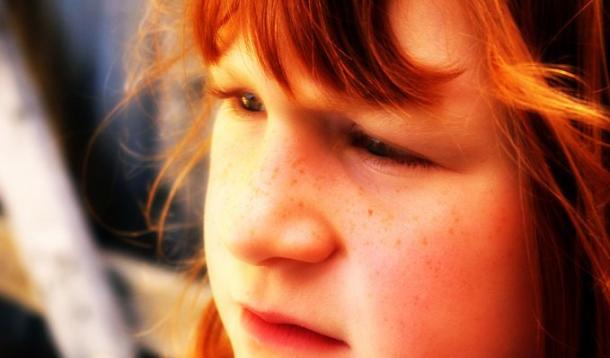
We parents are a weird lot when it comes to traditions, aren't we? Think about it. We urge our kids not only to approach a total stranger in a dodgy-looking red velour suit (an otherwise frowned upon activity 364 days a year), we tell him to climb onto the bearded man's LAP as he Ho, Ho, Hollers. No wonder even the most easygoing kid isn't necessarily cool with the arrangement.
When you factor in itchy formal attire, the cloying of carols, the brusque bustle of shoppers—not to mention blazing lights and lineups galore—the season can feel hellish for sensitive kids. Take my little man, for instance. The mere sound of nail clippers is 'painful' to him, so you can imagine how Christmas goes down. Before he was diagnosed with autism, we spent the better part of a gathering holed up in a bedroom away from the very family we were there to visit.
Is Autism The New ADHD?
I'm happy to report that we are a far sager lot now. Like every part of the holidays, though, preparation is key. Here are some tips on how to help a sensitive child (and parent!) survive the festive crazies:
Count down the days with a calendar and take care not to overschedule. Trade off with family members so your child isn't on the go too much.
Create a social story describing what will happen at each visit. Keep it simple and positive, from your child's point of view, e.g. "I will eat some turkey, then we will open presents." Don't assume your child knows how to act and react; set her up for success by outlining expected behaviour, like "I can look at decorations but should not touch them because they might break." Or better still, put breakables out of reach.
If necessary, have your child eat at a smaller table or before the entire group gets together. If your child is a fussy eater, have alternatives in place. The world won't come to an end if your child doesn't eat turkey and sprouts, though the atmosphere will be far less convivial if he descends into an epic meltdown. Trust me. Ditto for aforementioned itchy formal attire.
Decide on a dim, quiet space, away from the hubub, in which your child can regroup. Don't wait for the anxiety to set in. A favourite book or relaxing music on headphones are good bets, or join your child for a quick cuddle. A swift walk around the block might help for those needing a body break. You'll both feel recharged, and who knows, spontaneous singing may happen.
Let's Prevent Wandering: Safety Tips For Kids With Autism
Lastly, there is no need to fear the red-suited guy. Lots of places are becoming more attuned to sensory needs, granting special kids a special audience with Saint Nick. If the mall is not your bag, you can also seek out 'sensitive' Santas through various autism-friendly agencies. My son had a blast meeting Santa at the Geneva Centre last year, and we can't wait to deck the halls there again this year.
Do you have a 'sensitive' kid? How do you plan for success during the holidays?

When it comes to special needs, there seems to be two schools of parenting: one that aims to understand and accept and another that seeks to change or cure. My philosophy tends to align with the former. I'm done with laying blame. I'm done with reading up on the latest possible cause or the hottest new "remedy" for autism. Sorry, Jenny McCarthy. My son's not broken. As far as I'm concerned, he just has a different way of seeing and dealing with the world.
So it follows that he has a different approach to learning, too. School has been a problem, since I'm discovering that inclusion tends to mean throwing a child into a regular classroom, crossing your fingers, and hoping for the best. Needless to say, public school patently isn't working out for my kindergartner who's been told on one hand that he's too advanced for a diagnostic class, while on the other, clearly being too distressed to cope in a mainstream class.
Remember the days when some children were struck with rulers and metre sticks in school for writing with the "wrong" hand? Well, to my mind, autism is akin to being left-handed—which my son also is, coincidentally—in a world dominated by those who favour the right. It's a difference, not a deficit or a sign of demonic possession (though, admittedly, during a meltdown it can look that way).
So where does he belong? Where can he truly thrive? There is no straightforward, cookie-cutter answer. For now, I'm waiting on assessments to help determine the best possible placement. In the meantime I've been homeschooling for part of the day, and sending him to a special private school, hoping to strike some kind of happy balance that will cater to his individual needs.
Even Autistics who are verbal don't totally speak our language. So any time a rare and willing translator appears, I get excited. This is basically what happened when I came across the Asperger Experts via Asperger's Society of Ontario.
The "experts" in this case knows of what they speak. As kids, Danny Raede and Hayden Mears were both diagnosed with my son's type of autism—Asperger's Syndrome—and have experienced the gamut: bullying, therapies, etc. So more than anyone, they know how best to reach kids and really get through to them. They're the equivalent of autism whisperers, if you will. I've included a taster below, but more great videos can be found here.
Rather than cracking the stick, impressing my way of thinking on him and expecting him to meekly conform, here I am, sitting down at the desk. I've got my pen and notebook in hand, ready to learn a wonderful new language.